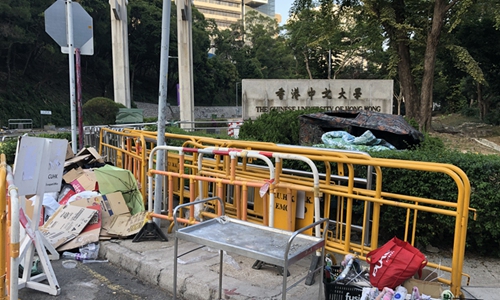HOME >> CHINA,SPECIAL-COVERAGE
HK university heads criticized for condoning rioters
By Bai Yunyi, Wang Wenwen and Yang Sheng in Hong Kong Source:Global Times Published: 2019/11/16 16:44:23

Photo:Wang wenwen/GT
The joint statement shows that they, as heads of top educational institutes expected to cultivate talent for Hong Kong have forgotten their duty and conscience, experts say, which is appalling and shameful.
This week, rioters besieged several universities, including the Chinese University of Hong Kong (CUHK), the Polytechnic University, and Hong Kong University, forcing staff members and students to evacuate.
While masked radicals took control of these universities, they set up their own "kingdoms," damaging properties, blocking the highway that leads to the universities and setting fire to vehicles, turning campuses into a warzone and bases for training terrorists.
On Saturday morning, rioters occupying the CUHK left the campus, leaving garbage behind and setting fire to a light rail.
The joint statement by university chiefs claimed that it is not realistic to count on universities to resolve the current political crisis as it is neither sparked by universities nor could it be resolved by universities' disciplinary processes.
Thus, they called on the government to take the lead with swift and concrete actions.
Observers pointed out that in the joint statement, the university chiefs still did not explicitly condemn the rioting and even avoided using the term "rioters."
Before the joint statement on Friday, Tuan released an open letter, asking people from outside of the university to leave. Experts say this shows that Tuan has realized the damage the rioting could do to the campus, but he still failed to make a clear break from the rioters in an open manner.
The city's educators and university students say the statement lacks sincerity and universities should have taken disciplinary actions in face of campus violence even before the situation went out of control.
"If the students participated in illegal assemblies or riots, or were involved with absenteeism and abused or bullied other students and teachers, they have already broken the school regulations," a Hong Kong-based teacher of an international school surnamed Mu told the Global Times.
"Unfortunately, school managers didn't or dare not to do something to stop them, so this made the situation worse," Mu said, adding that not only the university students but teenagers in high schools and middle schools are also affected by radical ideology and extreme emotions.
A CUHK student from the mainland said he expected his university chief not to be bound by interests but to serve the students hailing all places. He also believes that the chief should not bow to the violence.
During a dialogue session between the university's president Rocky S Tuan and students in October, Tuan was constantly interrupted by local students. While the students besieged Tuan and urged him to condemn "police brutality" after the dialogue, Tuan apparently compromised as protesters applauded, which is "disappointing," according to the mainland student.
The CUHK has been labeled as the "University of Violence" by mainland students, as black-clad student protesters were seen wearing masks and practicing forces on campus.
"However, at that time, the president never opposed clearly such violent activities," said the mainland student who is currently in Shenzhen.
In an open letter to Tuan signed by a group of patriotic mainland students on Friday, the students blamed the CUHK president for sacrificing the interests of those who want to concentrate on study and harboring the so-called "freedom and democracy" demanded by violent protesters.
Mainland students from the University of Science and Technology also slammed the inaction of university authorities when one of their peers was assaulted by local students earlier this month.
In all of these circumstances, universities refused to call the police for fear of enraging local students.
A Hong Kong local alumnus of the CUHK surnamed Hung told the Global Times that the police have already told the public that the majority of the arrested suspects who participated in riots were university students, but the chiefs of those major universities in Hong Kong did not use their authority to stop their students from joining violent activities, such as expelling them.
"So how could they say the current situation can't be resolved through university disciplinary processes?" Hung questioned.
No university in this world will protect rioters and suspects involved in terrible violent activities, and expelling them from their studentship should be an imminent action that the universities need to stick to, Hung noted.
"These universities even stopped the police from arresting violent suspects from their campuses, and this is protecting rioters from the lawful punishment, so I hope these chiefs would stop shielding rioters, otherwise they should resign. If the situation gets worse, they might get lawsuit as well since they are shielding criminals," Hung said.
But he also understands that senior managers of the universities have very limited power and their safety would be jeopardized if they act tough with the radical protesters.
The recent chaos has triggered many mainland students' return to the mainland for safety. This has had a spill-over effect as overseas universities are calling back exchange students in Hong Kong, such as the UK's Warwick University and Edinburgh University.
Posted in: HK/MACAO/TAIWAN,FOCUS NEWS